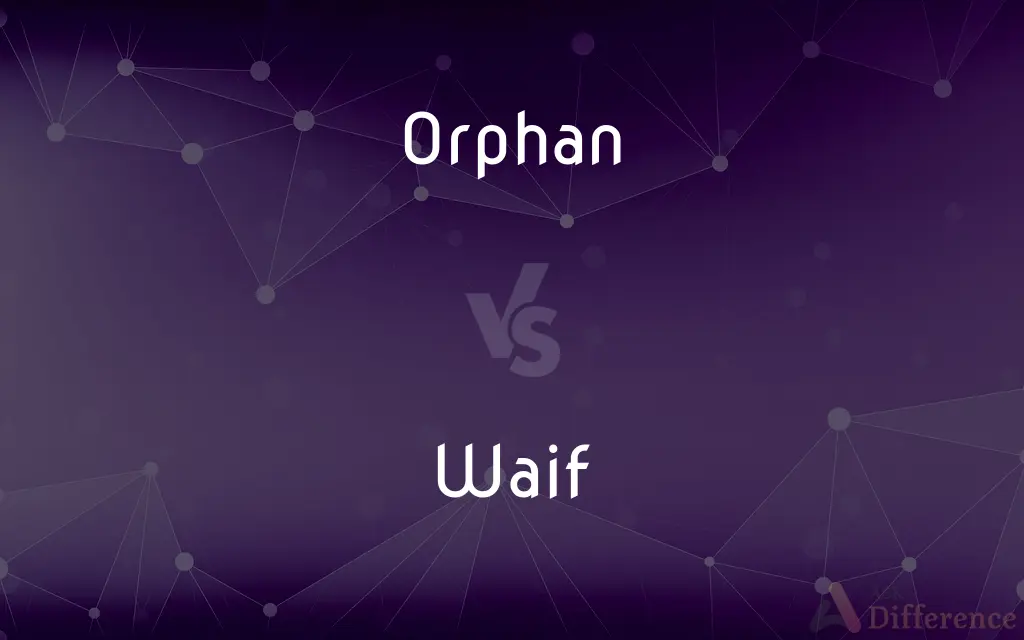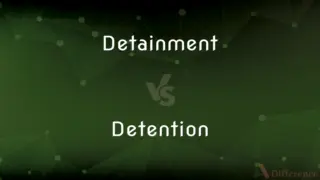Orphan vs. Waif — What's the Difference?
By Tayyaba Rehman & Fiza Rafique — Updated on May 16, 2024
Orphan refers to a child whose parents are deceased, while waif describes a homeless or neglected child, often appearing thin and unkempt.

Difference Between Orphan and Waif
Table of Contents
ADVERTISEMENT
Key Differences
Orphan specifically denotes a child who has lost both parents. This term emphasizes the absence of parental figures due to death. Orphans may live in orphanages, foster homes, or with relatives, focusing on the lack of biological parents. Waif, on the other hand, describes a homeless or abandoned child who appears frail and neglected. The term conveys a sense of vulnerability and often refers to children who are lost or left without care, regardless of whether their parents are alive.
Orphan carries a more defined legal and social status, often leading to specific custodial and welfare arrangements. These children are often part of formal systems designed to care for parentless minors. Waif implies a more general and often transient state of neglect and homelessness. The term evokes imagery of children who are not only without parents but also without any stable home or care system.
While orphan focuses on the loss of parents and the subsequent care arrangements, waif emphasizes the child's current physical state and lack of any guardian or protector.
The word orphan is used in contexts discussing legal guardianship, adoption, and social services. Conversely, waif is more descriptive and used in literary or emotional contexts to evoke sympathy and concern for the child's plight.
Orphan, a more formal term, is widely used in legal, social, and caregiving discussions. Waif, though less formal, poignantly highlights the child's destitution and vulnerability, often appearing in literature and media to elicit empathy.
ADVERTISEMENT
Comparison Chart
Definition
A child whose parents are deceased
A homeless or neglected child
Focus
Absence of parents
Homelessness and neglect
Legal Status
Often involves formal custodial arrangements
No specific legal implications
Usage Context
Legal, social services
Literary, emotional
Imagery
Parental loss
Vulnerability and frailty
Compare with Definitions
Orphan
A child whose parents have died.
After the accident, Jane became an orphan.
Waif
A person appearing thin and frail.
She looked like a waif in her oversized clothes.
Orphan
An item left without a counterpart.
The orphaned sock had no match.
Waif
An abandoned or lost item.
The old boat was a waif adrift in the sea.
Orphan
An orphan (from the Greek: ορφανός, romanized: orphanós) is a child whose parents have died, are unknown, or have permanently abandoned them.In common usage, only a child who has lost both parents due to death is called an orphan. When referring to animals, only the mother's condition is usually relevant (i.e.
Waif
A homeless or neglected child.
The waif wandered the streets looking for food.
Orphan
A child whose parents are dead.
Waif
A stray animal.
The shelter took in a waif of a dog found wandering alone.
Orphan
A child who has been deprived of parental care and has not been adopted.
Waif
Someone who is vulnerable or defenseless.
The young actress played the role of a waif perfectly.
Orphan
A young animal that has been prematurely separated from its parents or its mother.
Waif
A waif (from the Old French guaif, "stray beast") is a living creature removed, by hardship, loss or other helpless circumstance, from its original surroundings. The most common usage of the word is to designate a homeless, forsaken or orphaned child, or someone whose appearance is evocative of the same.
Orphan
One that lacks support, supervision, or care
A lack of corporate interest has made the subsidiary an orphan.
Waif
A homeless person, especially a forsaken or orphaned child.
Orphan
A technology or product that has not been developed or marketed, especially on account of being commercially unprofitable.
Waif
An abandoned young animal.
Orphan
(Printing) A very short line of type at the bottom of a paragraph, column, or page.
Waif
A person, especially a young woman, who is thin or gaunt.
Orphan
Deprived of parents.
Waif
Something found and unclaimed, as an object cast up by the sea.
Orphan
Intended for orphans
An orphan home.
Waif
See waft.
Orphan
Lacking support, supervision, or care.
Waif
Often in the form waif and stray, waifs and strays: an article of movable property found of which the owner is not known, such as goods washed up on a beach or thrown away by an absconding thief; such items belong to the Crown, which may grant the right of ownership to them to a lord of a manor.
Orphan
Being a technology or product that is an orphan.
Waif
(figuratively)
Orphan
To deprive (a child or young animal) of a parent or parents.
Waif
Something found, especially if without an owner; something which comes along, as it were, by chance.
Orphan
A person, especially a minor, both or (rarely) one of whose parents have died.
Waif
A person (especially a child) who is homeless and without means of support; also, a person excluded from society; an outcast.
Orphan
A person, especially a minor, whose parents have permanently abandoned them.
Waif
(by extension) A very thin person.
Thesaurus:thin person
Thesaurus:fat person
Orphan
A young animal with no mother.
Waif
A plant introduced in a place outside its native range but is not persistently naturalized.
Orphan
(figuratively) Anything that is unsupported, as by its source, provider or caretaker, by reason of the supporter's demise or decision to abandon.
Waif
A small flag used as a signal.
Orphan
(typography) A single line of type, beginning a paragraph, at the bottom of a column or page.
Waif
Something (such as clouds or smoke) carried aloft by the wind.
Orphan
(computing) Any unreferenced object.
Waif
(transitive) To cast aside or reject, and thus make a waif.
Orphan
Deprived of parents (also orphaned).
She is an orphan child.
Waif
Goods found of which the owner is not known; originally, such goods as a pursued thief threw away to prevent being apprehended, which belonged to the king unless the owner made pursuit of the felon, took him, and brought him to justice.
Orphan
Remaining after the removal of some form of support.
With its government funding curtailed, the gun registry became an orphan program.
Waif
Hence, anything found, or without an owner; that which comes along, as it were, by chance.
Orphan
(transitive) To deprive of parents used almost exclusively in the passive
What do you do when you come across two orphaned polar bear cubs?
Waif
A wanderer; a castaway; a stray; a homeless child.
A waifDesirous to return, and not received.
Orphan
To make unavailable, as by removing the last remaining pointer or reference to.
When you removed that image tag, you orphaned the resized icon.
Removing categories orphans pages from the main category tree.
Waif
A homeless child especially one forsaken or orphaned;
Street children beg or steal in order to survive
Orphan
A child bereaved of both father and mother; sometimes, also, a child who has but one parent living.
Orphan
Bereaved of parents, or (sometimes) of one parent.
Orphan
To cause to become an orphan; to deprive of parents.
Orphan
A child who has lost both parents
Orphan
Someone or something who lacks support or care or supervision
Orphan
The first line of a paragraph that is set as the last line of a page or column
Orphan
A young animal without a mother
Orphan
Deprive of parents
Orphan
Deprived of parents by death or desertion
Orphan
A young person deprived of parental care.
The orphan was placed in a foster home.
Orphan
An animal without its mother.
The kitten was an orphan after the mother cat was hit by a car.
Orphan
Someone without support or protection.
He felt like an orphan in the big city.
Common Curiosities
Is a waif always a child?
No, but the term is most commonly associated with children.
Can an adult be considered an orphan?
No, the term generally refers to children.
What distinguishes an orphan from a waif?
An orphan has lost both parents, while a waif is homeless or neglected.
What is a waif?
A waif is a homeless or neglected child.
What is an orphan?
An orphan is a child whose parents have died.
Can an orphan also be a waif?
Yes, an orphan can be a waif if they are also homeless or neglected.
Is the term waif used legally?
No, it is more descriptive and used in literature or casual speech.
Can waif be used for animals?
Yes, it can describe stray or abandoned animals.
Do orphans have to be in orphanages?
No, orphans can be in foster care, adopted, or living with relatives.
Are waifs always in a state of neglect?
Typically, yes, waifs are seen as neglected or vulnerable.
Do orphans have legal protections?
Yes, there are laws and systems to protect orphans.
Is "orphan" a formal term?
Yes, it is used in legal and social contexts.
Does "waif" evoke sympathy?
Yes, it often evokes an emotional response of pity or concern.
Is there support specifically for waifs?
Generally, no formal support system is specifically for waifs, but general child welfare services apply.
Can a waif have living parents?
Yes, waifs can have living parents but still be homeless or neglected.
Share Your Discovery

Previous Comparison
Detainment vs. Detention
Next Comparison
Concept vs. SkillAuthor Spotlight
Written by
Tayyaba RehmanTayyaba Rehman is a distinguished writer, currently serving as a primary contributor to askdifference.com. As a researcher in semantics and etymology, Tayyaba's passion for the complexity of languages and their distinctions has found a perfect home on the platform. Tayyaba delves into the intricacies of language, distinguishing between commonly confused words and phrases, thereby providing clarity for readers worldwide.
Co-written by
Fiza RafiqueFiza Rafique is a skilled content writer at AskDifference.com, where she meticulously refines and enhances written pieces. Drawing from her vast editorial expertise, Fiza ensures clarity, accuracy, and precision in every article. Passionate about language, she continually seeks to elevate the quality of content for readers worldwide.
















































